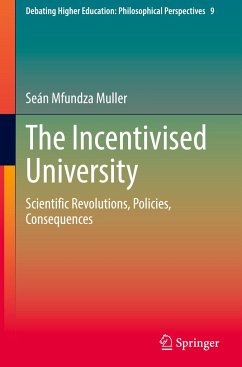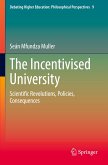The core thesis of this book is that to understand the implications of incentive structures in modern higher education, we require a deeper understanding of associated issues in the philosophy of science.
Significant public and philanthropic resources are directed towards various forms of research in the hope of addressing key societal problems. That view, and the associated allocation of resources, relies on the assumption that academic research will tend towards finding truth - or at least selecting the best approximations of it. The present book builds on, and extends, contributions in philosophy and higher education to argue that this assumption is misplaced: with serious implications for modern higher education and its role in informing societal decisions and government policy.
The book develops a philosophical foundation for the analysis of the connection between higher education incentives, scientific progress and societal outcomes. That in turn is used to demonstrate how the current approach to incentivising intellectual and scientific progress is likely not only to fail, but in fact to cause harm on the very dimensions it purports to improve. The arguments presented are illustrated with examples from medicine and academic economics, making the book one of the first to examine issues of scientific progress and social consequences across the human and social sciences. In doing so, it develops a novel critique of modern economics that in turn provides a more philosophically substantive foundation for popular critiques of economics than has existed to date.
Significant public and philanthropic resources are directed towards various forms of research in the hope of addressing key societal problems. That view, and the associated allocation of resources, relies on the assumption that academic research will tend towards finding truth - or at least selecting the best approximations of it. The present book builds on, and extends, contributions in philosophy and higher education to argue that this assumption is misplaced: with serious implications for modern higher education and its role in informing societal decisions and government policy.
The book develops a philosophical foundation for the analysis of the connection between higher education incentives, scientific progress and societal outcomes. That in turn is used to demonstrate how the current approach to incentivising intellectual and scientific progress is likely not only to fail, but in fact to cause harm on the very dimensions it purports to improve. The arguments presented are illustrated with examples from medicine and academic economics, making the book one of the first to examine issues of scientific progress and social consequences across the human and social sciences. In doing so, it develops a novel critique of modern economics that in turn provides a more philosophically substantive foundation for popular critiques of economics than has existed to date.
"The topic of the book is highly relevant: the use of incentives to steer research towards progress. ... The Incentivised University can be read as an analysis of the incentives and their detrimental effects on research, and it can be read as a debate book, an attempt to push these issues to the fore and to engage researchers, administrators, and policymakers." (Kåre Letrud, Metascience, Vol. 31 (2), July, 2022)









